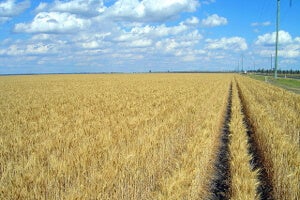Monsanto Unapproved GMO Wheat Escapes From The Lab, Lawsuits Follow

Share
Monsanto, the world’s largest seed company, recently reported the finding of unapproved genetically modified wheat in an Oregon field—and nobody knows where it came from. This is of concern, especially to farmers, but raises a larger question too. If genetic modification is the future, how will we control our creations?
The wheat at the center of this mystery was genetically modified to resist Monsanto’s herbicide, Roundup. The Oregon farmer discovered the plants growing in a fallow field and tried to kill them with the widely-used herbicide. When they survived, he sent samples to Oregon State University where tests revealed it had been genetically modified to contain a Roundup resistant CP4/maize EPSPS gene. The USDA later confirmed these findings.
Although Monsanto got FDA approval for the wheat in food, they withdrew their EPA application in 2004, due to farmers worried about the potential loss of markets in Europe and Asia. The firm ended field trials and never marketed the product.
Since the wheat was found and tested, Monsanto has been on the offensive to control what’s fast became a public relations mess.
Chief technology officer, Robb Fraley, noted to the press that the unapproved plants were found growing on less than one percent of the farmer’s 125-acre field, and Monsanto’s subsequent tests showed no sign of cross-contamination.
“It seems likely to be a random, isolated occurrence more consistent with the accidental or purposeful mixing of a small amount of seed during the planting, harvesting or during the fallow cycle in an individual field.”
The firm stopped planting Roundup Ready wheat in Oregon over 12 years ago, the seeds are only viable for two years in the soil, and this is the first incident since trials ended in 2005. Monsanto isn’t implicating the farmer, but they aren’t ruling out a deliberate act of sabotage by someone else.
Japan, South Korea, and Taiwan have postponed imports of US white wheat from the region while they continue to study information from US officials. Meanwhile, citing economic damages, Monsanto has been sued by an environmental group and Washington farm and another group in Kansas.
Heading up the Washington lawsuit, the Center for Food Safety stated, “Because scheduled shipments already have been postponed and canceled, the presence of genetically engineered wheat has detrimentally impacted the domestic and global wheat markets and damaged plaintiffs and other wheat farmers.”
Be Part of the Future
Sign up to receive top stories about groundbreaking technologies and visionary thinkers from SingularityHub.


Whether Monsanto is to blame or they’re the victim—how we control genetically modified plants or other organisms is a futuristic debate beginning in the here and now.
There are benefits to genetically modified crops. These include resistance to herbicides, diseases, and pests, better yield, increased shelf-life, and the potential for biofuel production. But opponents question whether genetically modified crops are safe, environmentally friendly, and whether genetically modified crops are really needed to address the world's food needs.
Although, in this case, it appears the wheat did not spread, it can be difficult to predict the impact genetically modified organisms will have once released into the world at large.
It’s generally in Monsanto’s interest to avoid such errors. But clearly they are not immune. And perhaps a worse outcome is when the Monsantos of the world lose control of their product, inadvertently or via sabotage, as appears happened in this case.
With rapid advancement of knowledge and expertise in biotechnology, there’s great potential to do good. However, incidents like this underline the fact that no good thing is risk-free. As genetic modification continues, expect more such controversies—and hopefully, in their wake, better safeguards.
Image Credit: Nick Saltmarsh/Flickr (banner, featured), Rae Allen/Flickr (body), Dag Endresen/Flickr (body)
Dr. Ian Anglin obtained his Ph.D. in molecular pathology from the University of Wales, College of Medicine in the United Kingdom. While writing his thesis entitled ‘Identification of Differential Gene Expression During Prostate Cancer Progression’ he contributed to a paper published in the International Journal of Cancer. Subsequently, Dr. Anglin pursued postdoctoral work at the University of Maryland, School of Medicine, Baltimore in various research departments including the Division of Urology, the Greenebaum Cancer Research Center and at the BioPark Center for Vascular and Inflammatory Diseases. During his 10 years there, he mentored students, contributed to NIH grants, presented data at various scientific meetings, was awarded an AFUD scholarship and won a Gordon Research Conference Travel scholarship. He has published in Cancer Research, Prostate Cancer and Prostatic Diseases, British Journal of Cancer and a book chapter in ‘Molecular Targeting and Signal Transduction’ edited by Dr. Rakesh Kumar. Dr. Anglin currently resides in Baltimore MD where he is working as a freelance scientific editor for various online companies providing substantive and copyediting services.
Related Articles

More Space Junk Is Plummeting to Earth. Earthquake Sensors Can Track It by the Sonic Booms.

Researchers Break Open AI’s Black Box—and Use What They Find Inside to Control It

This Week’s Awesome Tech Stories From Around the Web (Through February 21)
What we’re reading


